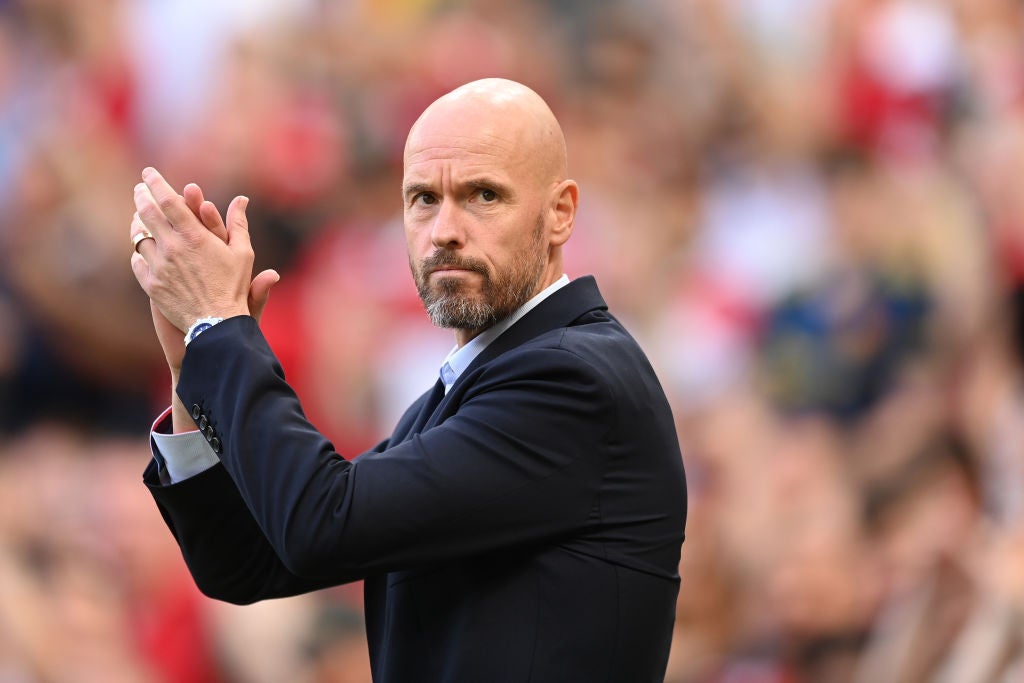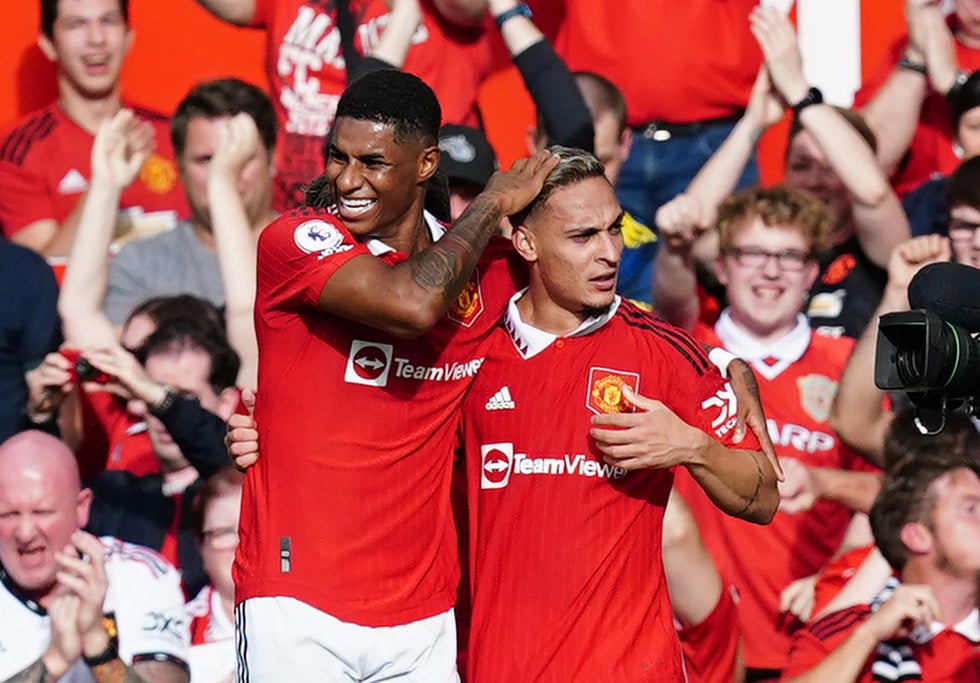Europa League offers Manchester United alternative route back to Europe’s top table
Manchester United are paying the price off the field after so long detached from the sharp end of the Champions League, but Erik ten Hag can start to change all that by winning the Europa League

Your support helps us to tell the story
From reproductive rights to climate change to Big Tech, The Independent is on the ground when the story is developing. Whether it's investigating the financials of Elon Musk's pro-Trump PAC or producing our latest documentary, 'The A Word', which shines a light on the American women fighting for reproductive rights, we know how important it is to parse out the facts from the messaging.
At such a critical moment in US history, we need reporters on the ground. Your donation allows us to keep sending journalists to speak to both sides of the story.
The Independent is trusted by Americans across the entire political spectrum. And unlike many other quality news outlets, we choose not to lock Americans out of our reporting and analysis with paywalls. We believe quality journalism should be available to everyone, paid for by those who can afford it.
Your support makes all the difference.This is the fifth time that Manchester United have competed in the Europa League in the last nine seasons and the third time they have entered at the group stage. If that now seems unremarkable and nothing out of the ordinary, it did not used to be. A first round exit to Rotor Volgograd on away goals was United’s last appearance in the second tier of European competition under Sir Alex Ferguson. That was all the way back in 1995.
From then onwards, Ferguson led United to 18 consecutive seasons of Champions League football, a run that only ended once he had retired having won it twice. A lot has changed since that long and unbroken streak started – both at Old Trafford and in football generally. The arithmetic of a Premier League ‘big six’ and only four qualifying spots for Europe’s elite competition means that at least two clubs are always likely to be disappointed. In recent years, United have too often found themselves on the wrong side of that divide.
One of the most frequently referenced quotes of former executive vice-chairman Ed Woodward was that “playing performance does not have a meaningful impact on what we can do on the commercial side of the business.” Those remarks were made on a conference call with investors more than four years ago now, and though often mocked, they were not wholly inaccurate. What’s more, on the surface, a record transfer spend of £229m in this summer’s window would suggest that they are still true.
There is, however, evidence to suggest that underwhelming performances on the pitch are starting to translate to the balance sheet. Revenues have grown under the Glazer family’s ownership, hitting a high point of £629m in 2019, but fell to £494m in the last full set of annual financial accounts. The impact of Covid-19 cannot be discounted but revenue growth had slowed at Old Trafford before the pandemic, allowing fellow members of the Premier League’s big six to catch up.
That is partly attributable to stagnant commercial revenues, which were once the driving force of United’s financial strength under the Glazers, yet were averaging just 1 per cent growth per year even pre-Covid. If this points to a diminished appeal compared to the Ferguson heydays, the best single indicator is United’s shirt sponsorship: after a record-breaking £64m-per-year deal with Chevrolet struck in 2012 ended last year, United agreed a new, five-year partnership with TeamViewer, worth approximately £17m less per season.
Another season outside of the Champions League would also have a material impact on United’s most lucrative existing sponsorship deal: the 10-year kit manufacturing partnership with Adidas, worth approximately £77m per season. If United do not return to European football’s top table next year, that deal will see a cut of 30% – a reduction of roughly £23m – and will not return to its original value until United qualify again. The Adidas partnership has three years left to run, expiring in 2025.

To put that in perspective, a £23m cut is more than United are likely to earn from Uefa in prize money for playing in the Europa League this season. The last time United competed solely in Europe’s secondary competition – during the 2019-20 campaign – they took home €15.6m (£13.8m). This is simply not where the money is. While a forecasted €2bn will be shared among Champions League clubs this season, those competing in the Europa League will split €465m between them. For a club of United’s stature, there is only a benefit to being in the Champions League, and even then, only really by reaching the knockout stages.
For the first time in three years, United did exactly that last season. Even though they exited at the last-16 stage to Atletico Madrid, they earned approximately €63m (£54.6m) in prize money. Though substantially less than runners-up Liverpool’s €104m and semi-finalists Manchester City’s €89m for comparison, it was still the 12th highest amount of any club competing in Europe and no doubt helped that record outlay in the summer market. Compare that figure to Eintracht Frankfurt, last season’s Europa League winners, who took home just €20m despite progressing all the way from the group stage.
Even if United also go all the way and triumph in Budapest in May, they are likely to receive around the same figure. The club accounts for seasons like this, inserting wage reduction clauses in player contracts, as highlighted with the £60m arrival of Casemiro from Real Madrid and in the case of Cristiano Ronaldo’s attempted departure. The shortfall compared to rivals who progress deep into the Champions League – some €80m relative to the winners – is significant, though, and becomes more and more noticeable in the books each season.
At least on the pitch, there is reason to cautiously believe that better times are ahead. Erik ten Hag’s start to life as United manager has been eventful to say the least but there is optimism after four straight wins. A busy transfer window addressed some of the holes in an imbalanced squad and cleared a number of players out, while the turmoil at Chelsea has opened up a top-four race that already seemed competitive before Thomas Tuchel’s sacking.
Nothing is guaranteed, though, and it may still be the case that winning the Europa League is a more straightforward route back to the Champions League. United narrowly trail Arsenal in the bookmakers’ outright market to win the competition, by less than they do in the odds to finish top four. And after the disappointment of Cologne and pain of Gdansk under Ole Gunnar Solskjaer, emulating Jose Mourinho’s 2017 win in Stockholm could be an excellent springboard for the Ten Hag era.
Qualifying through the backdoor is not ideal. Clubs who reach the Champions League by virtue of winning the Europa League do not receive a share of half of the market pool money dished out on the basis of domestic performance. But what’s another few million, given how much United have missed out on by not consistently qualifying for the Champions League over the past nine seasons? It is the minimum expectation at Old Trafford every season and one that, even United would admit, has not regularly been met.


Join our commenting forum
Join thought-provoking conversations, follow other Independent readers and see their replies
Comments